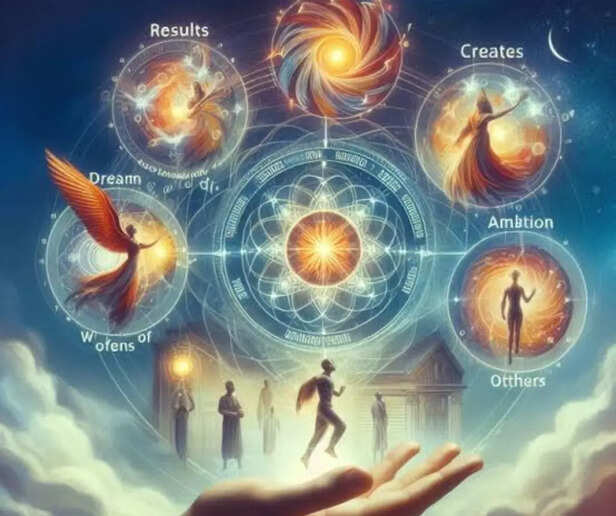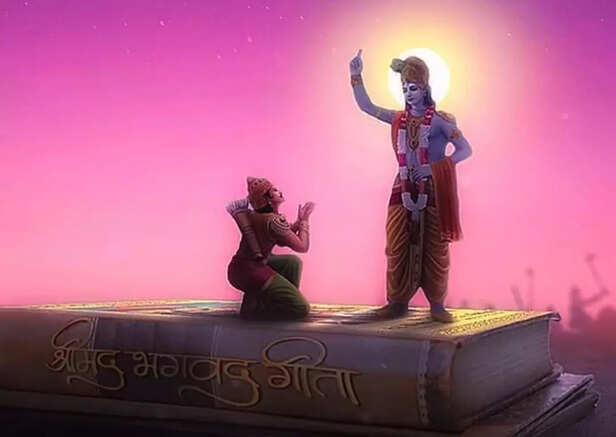Why Trying to Control Life Is Making You Miserable—The Gita's Ancient Fix
Ankit Gupta | May 26, 2025, 15:11 IST
Over 5,000 years ago, the Bhagavad Gita gave humanity a radical solution to this inner conflict—not through resignation, but through liberation. Its central teaching? Control is illusion. Detachment is freedom.
In a world that rewards control, micromanagement, and meticulous planning, we often find ourselves drowning in anxiety, disappointment, and an ever-growing dissatisfaction with life. We try to engineer outcomes, manipulate variables, and predict the unpredictable, only to be met with resistance, chaos, and suffering. The modern pursuit of control, ironically, is what’s making us miserable. Yet, over five millennia ago, the Bhagavad Gita offered a radical remedy to this suffering. Its core wisdom? Let go. Act, but don’t cling. Surrender, but don’t resign. In its timeless verses, the Gita teaches us that true peace and power come not from control, but from conscious detachment.

"Karmanye vadhikaraste ma phaleshu kadachana"
You have a right to perform your prescribed duties, but you are not entitled to the fruits of your actions.
This single verse from Chapter 2, Verse 47 of the Gita is a spiritual scalpel, slicing through the root of our misery—attachment to outcomes. Our desire to control life stems from an illusion: that happiness lies in securing specific results. But the Gita calls this out as a trap. When we tie our emotional state to outcomes (a job, a partner, recognition), we become slaves to circumstances beyond our control.
Modern psychology affirms this. Studies show that people who fixate on results experience more anxiety and lower satisfaction. The gap between expectation and reality creates cognitive dissonance, leading to chronic stress. The Gita proposes a liberating alternative: focus on right action, not on how it will be received.

"Prakriteh kriyamanani gunaih karmani sarvashah, Ahankara-vimudhatma kartaham iti manyate"
All actions are performed by the modes of material nature, but a person deluded by ego thinks, "I am the doer."
In Chapter 3, Verse 27, Krishna dismantles the illusion that we are the authors of all that happens. The ego feeds on this illusion. It whispers, "If you don't control this, it will fall apart." But the Gita reminds us that nature—prakriti—is the doer. We are instruments through which the universe flows.
When we accept that not everything is within our hands, we relieve ourselves of the pressure to fix, plan, and perfect. This doesn’t mean apathy; it means alignment. Our job is to act in harmony with dharma, not to usurp the role of the divine.

"Sarva-dharman parityajya mam ekam sharanam vraja"
Abandon all varieties of duties and simply surrender unto Me.
In Chapter 18, Verse 66, Krishna delivers the essence of the Gita’s wisdom: surrender. Not to a person or doctrine, but to the divine intelligence that orchestrates the cosmos. Surrender is not passive defeat; it is powerful acceptance.
The modern mind fears surrender because it associates it with weakness. But spiritual surrender is an act of supreme courage. It requires one to trust the process, even when outcomes defy logic. It asks us to relinquish the tight grip we have on life, and instead, open our palms to receive what is meant for us.
Through surrender, we gain access to a deeper peace. We are no longer rattled by fluctuations. Whether success or failure comes, we remain anchored.

The Gita doesn’t ask us to stop acting. It asks us to act without obsession over outcomes. This is the path of Karma Yoga—selfless action performed with awareness and detachment.
When we cook for the joy of cooking, write for the love of expression, or work for the integrity of labor—rather than the applause that follows—we are practicing Karma Yoga. This detachment doesn’t kill passion; it purifies it. We become like the lotus in muddy water: involved, but untouched.
Neuroscience also supports this. People in "flow states" – athletes, musicians, writers – perform best when they are not obsessing over results but are fully present in the act. This mirrors Karma Yoga perfectly.
The Gita's message is both ancient and urgent. In a time when control is glorified and surrender is misunderstood, it reminds us that true mastery of life comes not from grasping tightly, but from letting go.
Trying to control life will keep you on an emotional rollercoaster. But aligning your actions with dharma, surrendering the results, and trusting the flow of the universe leads to inner equanimity. As Krishna shows Arjuna, peace is not the absence of chaos, but the presence of wisdom.
So the next time life feels overwhelming, ask yourself: Am I trying to control too much? And then remember the Gita’s ancient fix: Act. Detach. Surrender. Be free.
The Root of Misery

Attachment to Results
"Karmanye vadhikaraste ma phaleshu kadachana"
You have a right to perform your prescribed duties, but you are not entitled to the fruits of your actions.
This single verse from Chapter 2, Verse 47 of the Gita is a spiritual scalpel, slicing through the root of our misery—attachment to outcomes. Our desire to control life stems from an illusion: that happiness lies in securing specific results. But the Gita calls this out as a trap. When we tie our emotional state to outcomes (a job, a partner, recognition), we become slaves to circumstances beyond our control.
Modern psychology affirms this. Studies show that people who fixate on results experience more anxiety and lower satisfaction. The gap between expectation and reality creates cognitive dissonance, leading to chronic stress. The Gita proposes a liberating alternative: focus on right action, not on how it will be received.
Ego's Grand Deception

Illusion of Control
"Prakriteh kriyamanani gunaih karmani sarvashah, Ahankara-vimudhatma kartaham iti manyate"
All actions are performed by the modes of material nature, but a person deluded by ego thinks, "I am the doer."
In Chapter 3, Verse 27, Krishna dismantles the illusion that we are the authors of all that happens. The ego feeds on this illusion. It whispers, "If you don't control this, it will fall apart." But the Gita reminds us that nature—prakriti—is the doer. We are instruments through which the universe flows.
When we accept that not everything is within our hands, we relieve ourselves of the pressure to fix, plan, and perfect. This doesn’t mean apathy; it means alignment. Our job is to act in harmony with dharma, not to usurp the role of the divine.
Let Go to Gain Freedom

The Power of Surrender
"Sarva-dharman parityajya mam ekam sharanam vraja"
Abandon all varieties of duties and simply surrender unto Me.
In Chapter 18, Verse 66, Krishna delivers the essence of the Gita’s wisdom: surrender. Not to a person or doctrine, but to the divine intelligence that orchestrates the cosmos. Surrender is not passive defeat; it is powerful acceptance.
The modern mind fears surrender because it associates it with weakness. But spiritual surrender is an act of supreme courage. It requires one to trust the process, even when outcomes defy logic. It asks us to relinquish the tight grip we have on life, and instead, open our palms to receive what is meant for us.
Through surrender, we gain access to a deeper peace. We are no longer rattled by fluctuations. Whether success or failure comes, we remain anchored.
Action Without Attachment

Karma Yog
( Image credit : Pixabay )
The Gita doesn’t ask us to stop acting. It asks us to act without obsession over outcomes. This is the path of Karma Yoga—selfless action performed with awareness and detachment.
When we cook for the joy of cooking, write for the love of expression, or work for the integrity of labor—rather than the applause that follows—we are practicing Karma Yoga. This detachment doesn’t kill passion; it purifies it. We become like the lotus in muddy water: involved, but untouched.
Neuroscience also supports this. People in "flow states" – athletes, musicians, writers – perform best when they are not obsessing over results but are fully present in the act. This mirrors Karma Yoga perfectly.
Liberation Through Letting Go
Trying to control life will keep you on an emotional rollercoaster. But aligning your actions with dharma, surrendering the results, and trusting the flow of the universe leads to inner equanimity. As Krishna shows Arjuna, peace is not the absence of chaos, but the presence of wisdom.
So the next time life feels overwhelming, ask yourself: Am I trying to control too much? And then remember the Gita’s ancient fix: Act. Detach. Surrender. Be free.
